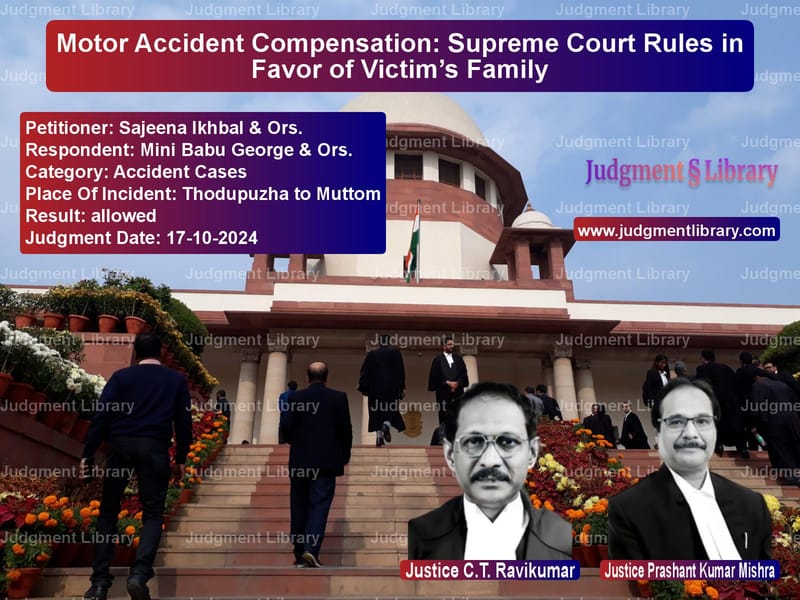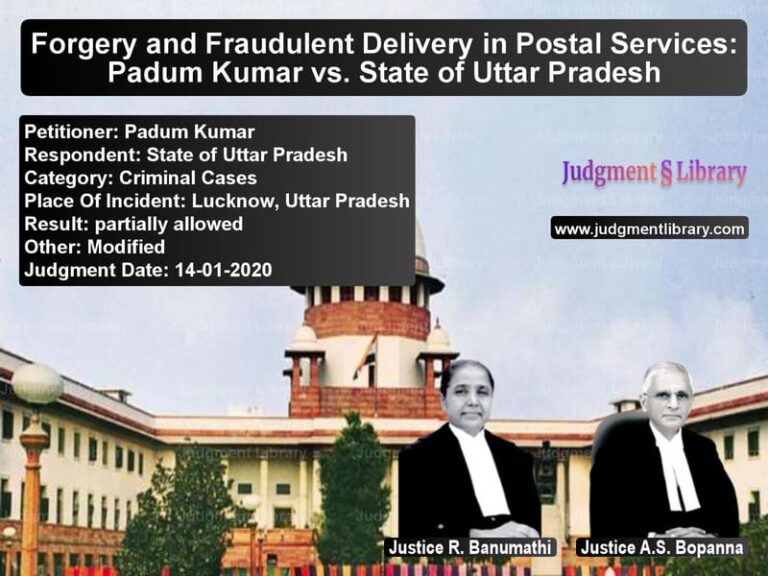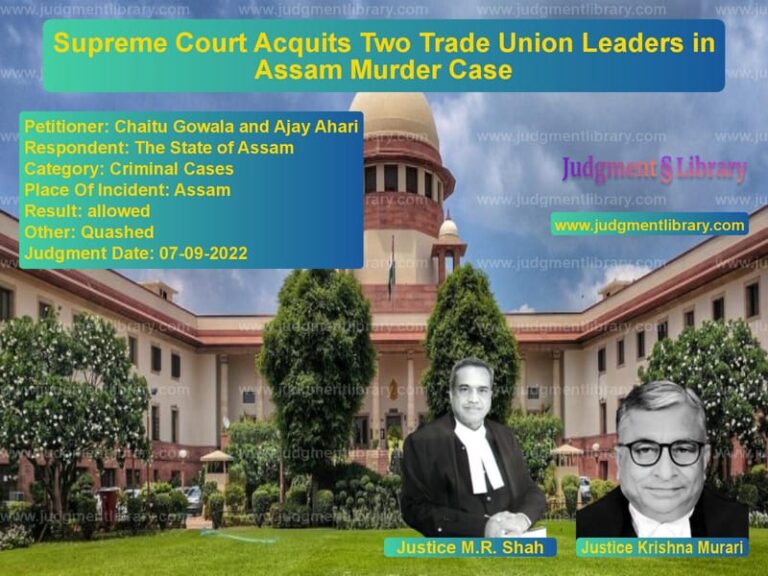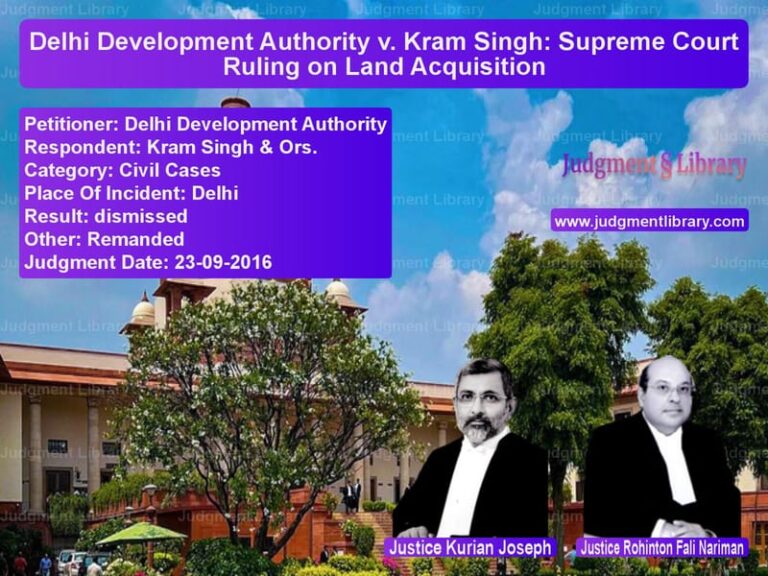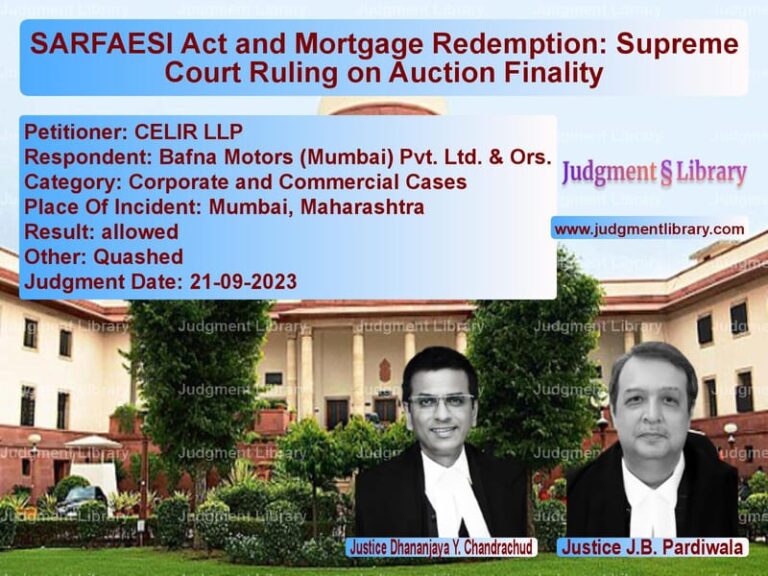Motor Accident Compensation: Supreme Court Rules in Favor of Victim’s Family
The tragic case of Ikhbal’s accident on June 10, 2013, highlights the complexities of motor accident claims and the necessity of careful judicial scrutiny in ensuring justice for victims and their families. This case involved a lengthy legal battle where the petitioners, comprising the deceased’s widow, minor child, and parents, sought compensation for the loss of their loved one, arguing that the accident occurred due to the negligent driving of the car owned by respondent no. 1 and driven by respondent no. 2. The case was initially dismissed by the Motor Accident Claims Tribunal (MACT), a decision upheld by the High Court of Kerala. However, upon appeal, the Supreme Court of India reviewed the case and ruled in favor of the victim’s family, granting them due compensation.
Background of the Case
On June 10, 2013, Ikhbal was traveling on his motorcycle from Thodupuzha to Muttom. As he reached a junction, a KSRTC bus in front of him stopped at a bus stop. As Ikhbal attempted to overtake the bus, a car driven by respondent no. 2 approached from the opposite direction and hit his motorcycle. The impact caused him to fall and sustain fatal injuries. Despite being rushed to the hospital, he succumbed to his injuries. The appellants claimed that the accident was caused solely due to the negligence of the driver of the car, which led to the filing of a claim against the vehicle’s owner, driver, and insurance provider.
The Motor Accident Claims Tribunal (MACT) assessed the total compensation to be Rs. 46,31,496/-. However, the claim was dismissed on the ground that the appellants failed to prove that the car was involved in the accident or that the driver was negligent.
Arguments by the Petitioners
- The petitioners contended that Ikhbal was a responsible rider and had no role in causing the accident.
- They emphasized that multiple eyewitnesses confirmed that the car driven by respondent no. 2 collided with the deceased’s motorcycle, leading to his fatal injuries.
- The widow and minor child of the deceased argued that they had lost their primary source of financial support.
- The petitioners maintained that the MACT and the High Court erred in dismissing their claim, relying on conjecture rather than evidence.
- The principle of res ipsa loquitur (the facts speak for themselves) was invoked, stating that the damage to the car, as recorded in the police report, was enough to prove its involvement in the accident.
Arguments by the Respondents
- The driver and insurer of the car denied any involvement in the accident.
- They argued that the deceased was negligent as he attempted to overtake a stationary bus and lost control of his motorcycle.
- They pointed out that none of the witnesses explicitly saw the car hitting the motorcycle.
- The respondents argued that both the MACT and the High Court had carefully examined the evidence and found no reason to attribute negligence to the driver.
Supreme Court’s Observations
- The Supreme Court noted that ordinarily, in appeals under Article 136 of the Constitution of India, it does not reappreciate evidence.
- However, it clarified that it could intervene if the findings of the lower courts were perverse or based on a misreading of evidence.
- The Court found substantial evidence indicating the car’s involvement:
- The police report recorded damage to the car’s front bumper and grill, confirming impact.
- Witnesses corroborated the sequence of events that led to the accident.
- The car driver himself admitted that the motorcycle skidded in front of his vehicle.
- The Court held that the lower courts failed to apply the principle of preponderance of probability, which is crucial in motor accident claims.
Supreme Court’s Verdict
- The Supreme Court ruled that the deceased died due to an accident involving the insured car.
- It set aside the judgments of the MACT and the High Court.
- The Court awarded the appellants a compensation of Rs. 46,31,496/- with interest at 9% per annum from the date of filing of the claim until realization.
- The Court ordered that if the amount is not paid within three months, the interest rate would increase to 12% per annum.
Conclusion
This judgment by the Supreme Court ensures justice for the family of the deceased, reinforcing the principle that motor accident claims must be adjudicated with a balanced approach that considers all available evidence. The ruling also highlights the importance of the preponderance of probability principle, which requires courts to analyze the likelihood of events rather than seek absolute proof. By overturning the lower courts’ erroneous findings, the Supreme Court has reinforced the rights of accident victims and their families in seeking fair compensation.
Petitioner Name: Sajeena Ikhbal & Ors..Respondent Name: Mini Babu George & Ors..Judgment By: Justice C.T. Ravikumar, Justice Prashant Kumar Mishra.Place Of Incident: Thodupuzha to Muttom.Judgment Date: 17-10-2024.
Don’t miss out on the full details! Download the complete judgment in PDF format below and gain valuable insights instantly!
Download Judgment: sajeena-ikhbal-&-ors-vs-mini-babu-george-&-o-supreme-court-of-india-judgment-dated-17-10-2024.pdf
Directly Download Judgment: Directly download this Judgment
See all petitions in Compensation Disputes
See all petitions in Motor Vehicle Act
See all petitions in Negligence Claims
See all petitions in Road Accident Cases
See all petitions in Judgment by C.T. Ravikumar
See all petitions in Judgment by Prashant Kumar Mishra
See all petitions in allowed
See all petitions in supreme court of India judgments October 2024
See all petitions in 2024 judgments
See all posts in Accident Cases Category
See all allowed petitions in Accident Cases Category
See all Dismissed petitions in Accident Cases Category
See all partially allowed petitions in Accident Cases Category

